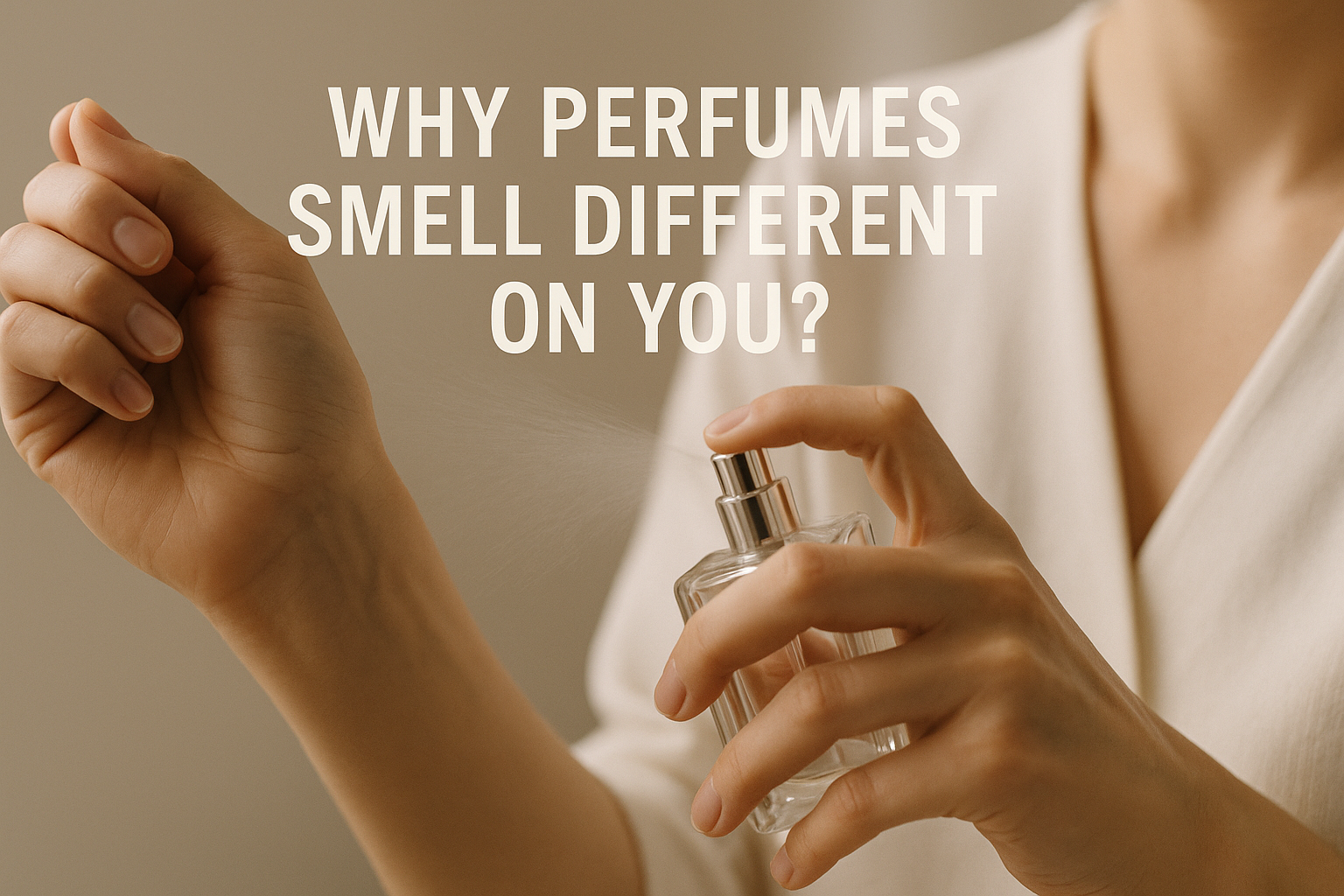Introduction: Why Perfumes Smell Different On You is the Question That Changes Everything
I am Rodrigo, fragrance consultant at Liquo in Santiago and the writer behind Scent Chronicles. Every day I watch the same bottle tell a different story on different people. Why Perfumes Smell Different On You is not a trick of marketing. It is chemistry, temperature, and lifestyle meeting perfumer craft. As Chandler Burr put it, “A great perfume does not merely smell beautiful. It creates an aura, a context, a presence.”
This guide explains the science in simple words, then gives you repeatable steps to find smells that feel like you.
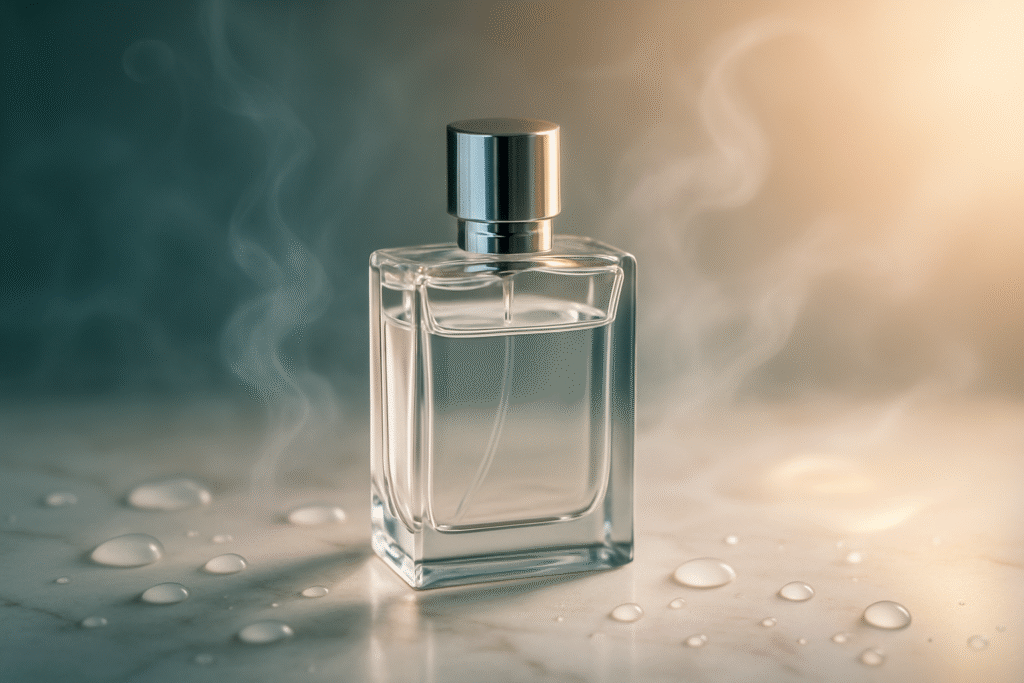
Quick summary for busy readers
Perfumes change on skin because of four main variables: pH balance, skin type and hydration, body temperature, and internal factors like diet and hormones. To fix disappointing results, test on skin for at least 3 hours, moisturize before spraying, place fragrance on pulse points, and match scent styles to your chemistry. Start with discovery sets and travel sizes, then buy the full bottle only after three separate wears.
Related reads on Scent Chronicles
Why Perfumes Smell Different On You: The Short Answer
Your skin is not a neutral surface. It has acidity, oil, heat, and a faint natural odor. Fragrance molecules meet that surface and evolve. That is why bergamot can sparkle on your friend but turn flat on you, or why amber feels rich on you but sticky on someone else. Know your variables, then choose styles that work with your chemistry, not against it.
The Four Variables You Can Control
pH Balance Is The Quiet Game Changer
Most skin sits around pH 4.5 to 5.5. Slight acidity can sharpen citrus and green facets. Slight alkalinity can round and sweeten bases. Lund University notes that skin pH varies only a bit between people, yet other circumstances like products and environment can push it temporarily off balance.
How to work with it
- Use gentle, pH-balanced cleansers for 48 hours before a serious test.
- Apply a thin layer of unscented moisturizer before spraying. This gives the perfume a stable canvas.
- If bright openings die fast on you, pick citruses anchored by woods or modern musks such as Ambroxan. See What Is Ambroxan in Perfumery? for details.

Quoted insight
Michael Edwards explains that the heart is the true personality that emerges once initial volatility passes. “Heart notes form the core of the fragrance.”
Translation for daily life: judge at the 3 hour mark, not the first 3 minutes.
Skin Type Changes Longevity And Balance
- Oily skin acts like a fixative. Heavy notes bloom and last.
- Dry skin lets volatile molecules escape quickly. Openings fade, hearts feel faint.
Per Perfumer & Flavorist, top notes are the quickest to evaporate, often under 30 minutes, which is why dry skin can feel like a disappearing act.
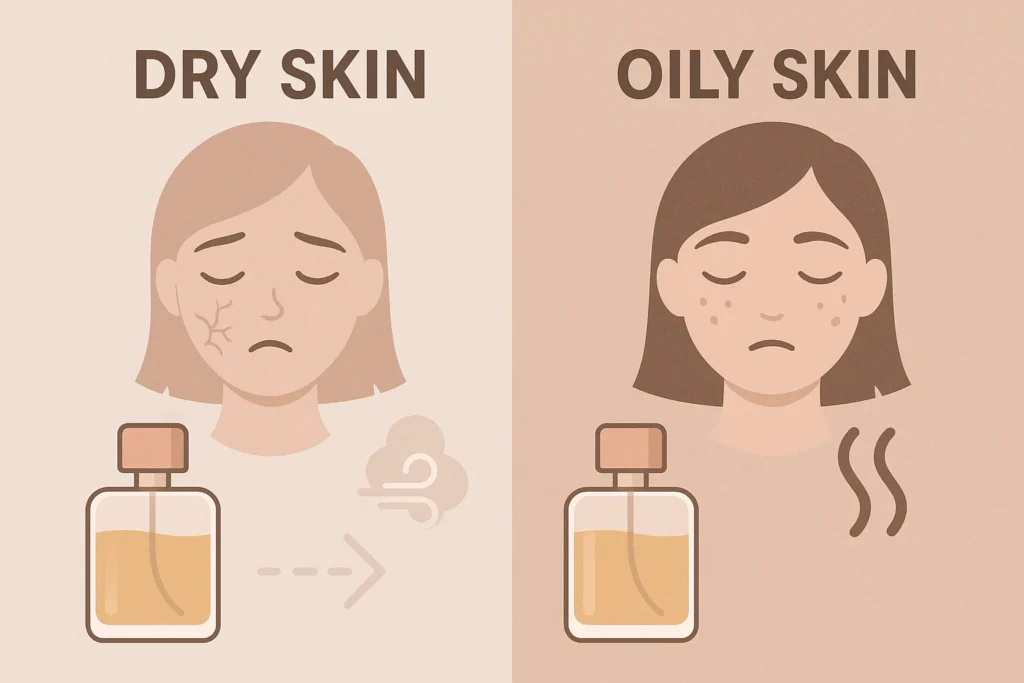
How to work with it
- Dry skin: moisturize or add a drop of neutral body oil on pulse points before spraying.
- Oily skin: go easy on sprays and choose fresher woods, tea, and airy musks to avoid overload.
- Balanced skin: keep hydration consistent. You will get the most faithful read.
Try these pairings
- Dry and you want presence: Tom Ford Oud Wood, Parfums de Marly Herod.
- Oily and you want clarity: Matière Première Parisian Musc, Jo Malone Wood Sage & Sea Salt.
For a warm tobacco that remains elegant on many skins, see Xerjoff Naxos. For a bright fruit-musk that reads polished, try Erba Pura.
Body Temperature Controls Diffusion
Heat speeds evaporation and boosts projection. Cooler skin keeps scent closer and often smoother in the drydown.

How to work with it
- Hot days: spray torso under clothes or the back of the knees.
- Cool days: wrists, neck, and chest help diffusion.
- For subtle trails, one light mist on the back of the neck often feels perfect.
Curious about trails and projection? Read What Is Sillage in Perfumery?.
Diet And Hormones Are Wild Cards
The Cleveland Clinic points out that foods like garlic, asparagus, fish, and red meat can influence body odor. Hormonal shifts can also change how you perceive musks, white florals, and ambers.

How to work with it
- Before important events, keep meals simple and hydrate.
- If a favorite smells off one week, wait and retry. Your perception shifts too.
- On spicy-food nights, go for clean citrus, green tea, or mineral musks that sit neat.
Why Perfumes Smell Different On You: A Simple Look At The Fragrance Pyramid
The perfume architecture has three acts. Understanding them keeps you from buying the wrong bottle.
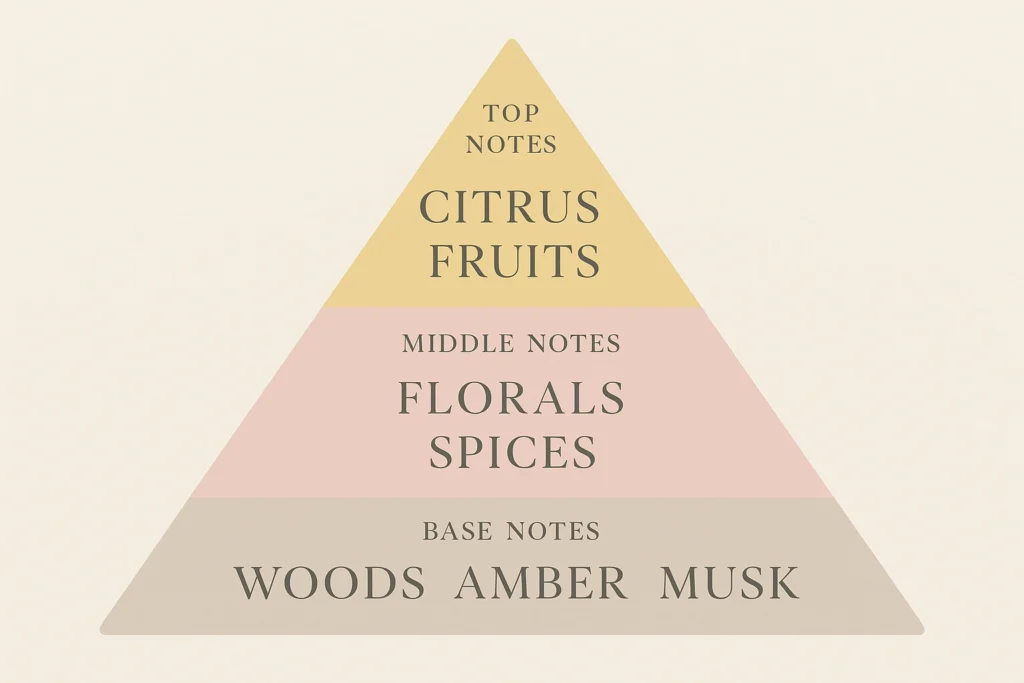
Top notes
The bright hello. Often citrus, herbs, light fruits. Evaporate quickly. Perfumer & Flavorist describes them as the immediate impact that disappears within minutes.
Heart notes
The true character. Florals, spices, tea, greens. As Michael Edwards writes, they are the core you should judge.
Base notes
The memory. Woods, resins, vanilla, musks. Perfumer Christophe Laudamiel explains that bases rely on slower-evaporating materials that give weight and persistence.
Read more about fragrance families to learn more about their note development!
Why Perfumes Smell Different On You: Test Like A Pro With The Liquo Method
I use this flow with clients at Liquo. It prevents buyer’s remorse and builds confidence.
- Shortlist on blotters. Smell 5 to 7, toss the maybes.
- Put 2 or 3 on skin only. Label wrists or take phone photos.
- Live 3 to 6 hours with them. Step outside, drink coffee, move.
- Re-test on another day. If you still love it, get a travel size.
- Wear three separate days before buying a full bottle.
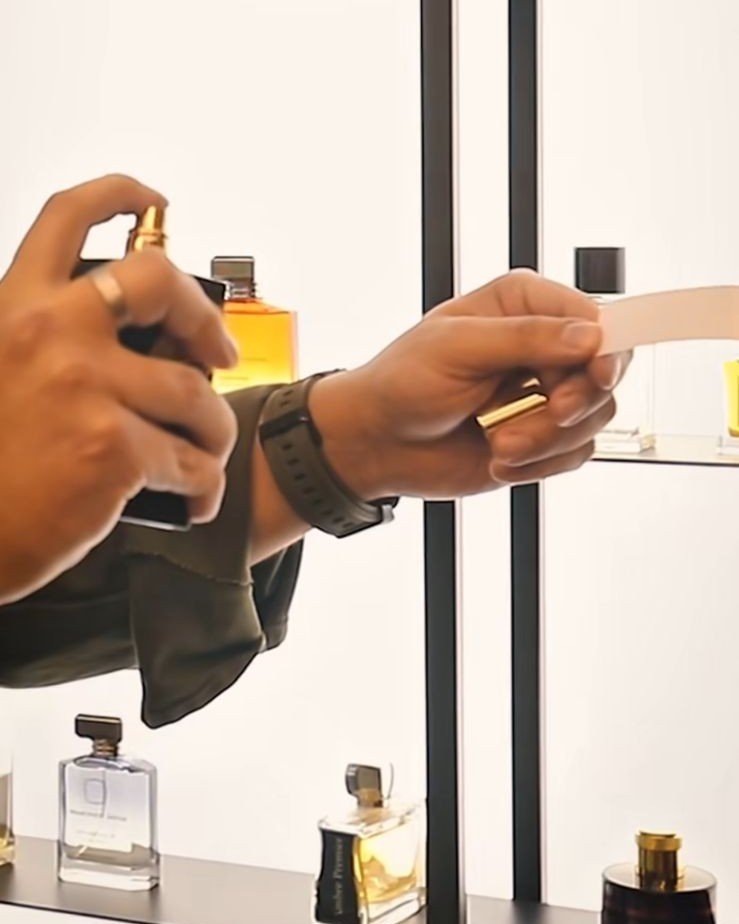
Olfactory research shows our noses tire after a handful of scents, which is why short, focused sessions work best.
Not sure which three to test first? Comment with two perfumes you enjoy and your skin type. I will reply with tailored testers and where to apply them.
Why Perfumes Smell Different On You: Map Scents To Your Chemistry
Why Perfumes Smell Different On You if Your Skin Is Dry
What happens
Openings fade fast. Hearts feel quiet. Bases can feel thin.
What to try
- Styles with body: amber, vanilla, tonka, sandalwood, patchouli, resin.
- Examples: Tom Ford Oud Wood, Parfums de Marly Herod, Dior Homme Intense.
- Prep: moisturize first, then spray 6 to 8 inches from skin.
Why Perfumes Smell Different On You if Your Skin Is Oily
What happens
Longevity is great. Rich notes can bloom into too much.
What to try
- Crisp woods, vetiver, tea, airy musks, neroli.
- Examples: Acqua di Gio, Bleu de Chanel EDP, Matière Première Parisian Musc.
- Practice restraint: two to three sprays are enough.
Why Perfumes Smell Different On You if You Run Warm
What happens
Projection spikes, longevity can shorten.
What to try
- Lighter concentrations and brisk aromatics in heat.
- Apply on cooler zones like the back of knees or lower back.
Why Perfumes Smell Different On You in Cold Weather
What happens
Diffusion slows. Scent feels closer.
What to try
- Spices, amber, tobacco, leather for presence.
- Example: Xerjoff Naxos for honeyed tobacco that reads elegant.
Why Perfumes Smell Different On You: Make Any Scent Last Longer
- Hydrate skin with unscented lotion before spraying.
- Spray pulse points from 6 to 8 inches away.
- Do not rub wrists. Let it air-dry.
- Spray clothing lightly if the fabric is safe.
- Store bottles cool and dark. The Osmothèque reminds us that light, heat, and oxygen are the enemies of perfume.
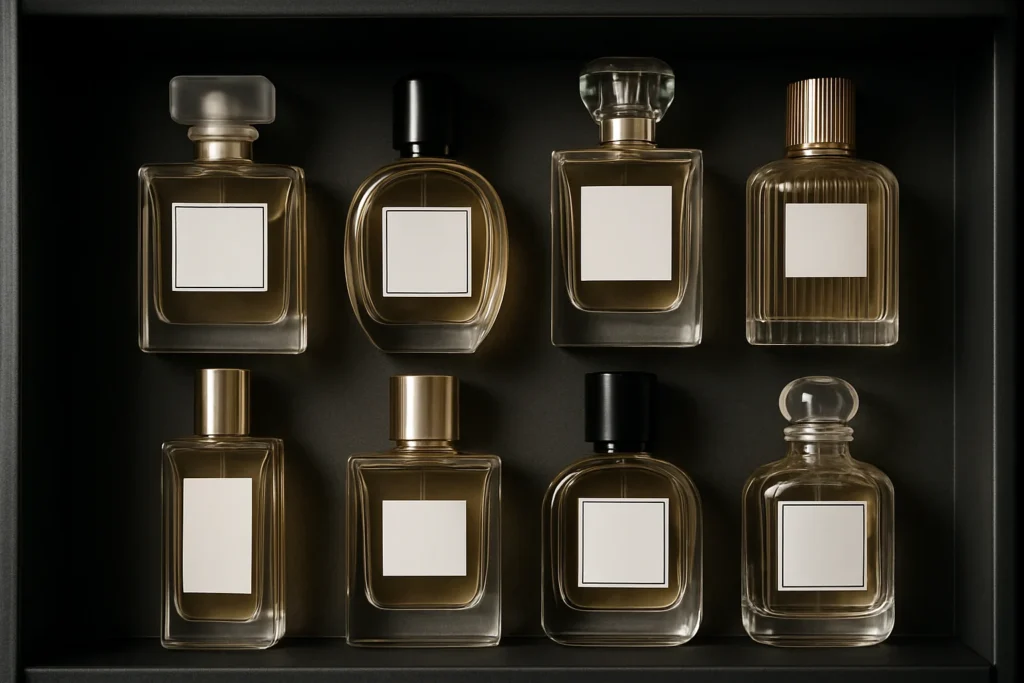
To learn more about this topic, read this article about How to Make Your Perfume Last Longer.
Mini layering idea
Pair a neutral, airy wood musk under a citrus or floral you love. It lengthens the heart without turning heavy. Read this layering 101 guide!
Why Perfumes Smell Different On You: A 7-Day Plan You Can Follow
- 1-2: Choose two families to explore, for example, fresh woods and soft florals.
- 3: Blotter screening. Keep three finalists.
- 4: Skin test two candidates. Note time and weather.
- 5: Re-test your favorite and add one challenger.
- 6:Wear the winner on a warm errand run or commute.
- 7: Wear it in a cooler indoor settingDecide on a travel size or a bottle. If torn, keep testing. Perfume should feel easy.
Trusted Sources, So You Know This Is Solid
- Chandler Burr archive at The New York Times.
- Roja Dove, The Essence of Perfume.
- Perfumer & Flavorist on volatility and top notes.
- Michael Edwards, Fragrances of the World.
- Christophe Laudamiel on slow-evaporation materials in bases.
- Cleveland Clinic on foods and body odor.
- Osmothèque on storage enemies: light, heat, oxygen.
Luca Turin also reminds us that a good fragrance wardrobe includes an everyday scent, an evening option, and a wildcard. That small plan prevents boredom and helps you wear the right perfume for your chemistry that day.
Why Perfumes Smell Different On You: Smart, Non-Spammy Shopping Moments
- Discovery sets for real testing at home
- Travel sizes for a full week of wear
- Trusted discounters when budget matters

FAQs
Paper has no oil, acidity, or heat. Your skin does. Test on skin and judge at the 3 hour mark.
Yes. Oily skin intensifies heavy notes and extends longevity. Dry skin loses light notes quickly. Hydration fixes a lot.
Moisturize before spraying, apply on pulse points, avoid rubbing, and consider a light mist on clothing from a distance. Store bottles away from heat and light.
It helps. Heat amplifies diffusion, so fresher styles perform better in warm months. Richer notes shine in the cold.
Diet, hormones, stress, and recent skincare can shift perception. Re-test a week later.
Yes. Many people keep a daily driver, an evening option, and a seasonal favorite. That still feels like a signature because it is consistently you.
Keep Exploring Scent Chronicles
Ingredients: What Is Ambroxan in Perfumery?
Foundations: What Is Perfume?
Performance: What Is Sillage in Perfumery?
Personalization: How To Find Your Signature Scent
Seasonal picks: Best Fall Perfumes for Men and Best Fall Perfumes for Women
Reviews to try next: Xerjoff Erba Pura Review and Xerjoff Naxos Review
I may earn a commission if you buy through links on this page, at no extra cost to you. As an Amazon Associate, I earn from qualifying purchases. I only recommend fragrances I’ve tested or genuinely believe in.

About Rodrigo Hernández
Fragrance consultant at Liquo (Santiago, Chile). I test designer and niche releases weekly, keep personal wear logs, and cross-check notes and performance in different climates. Opinions are my own; no brand pays for favorable coverage.
Contact: contact@scentchronicles.com

